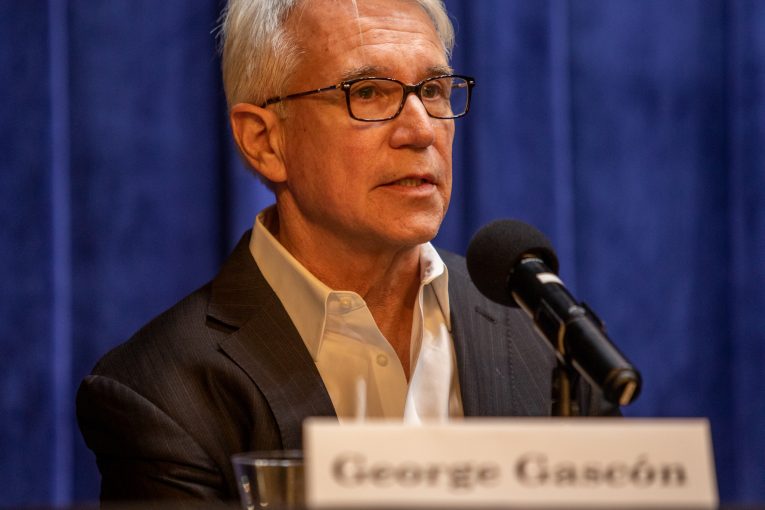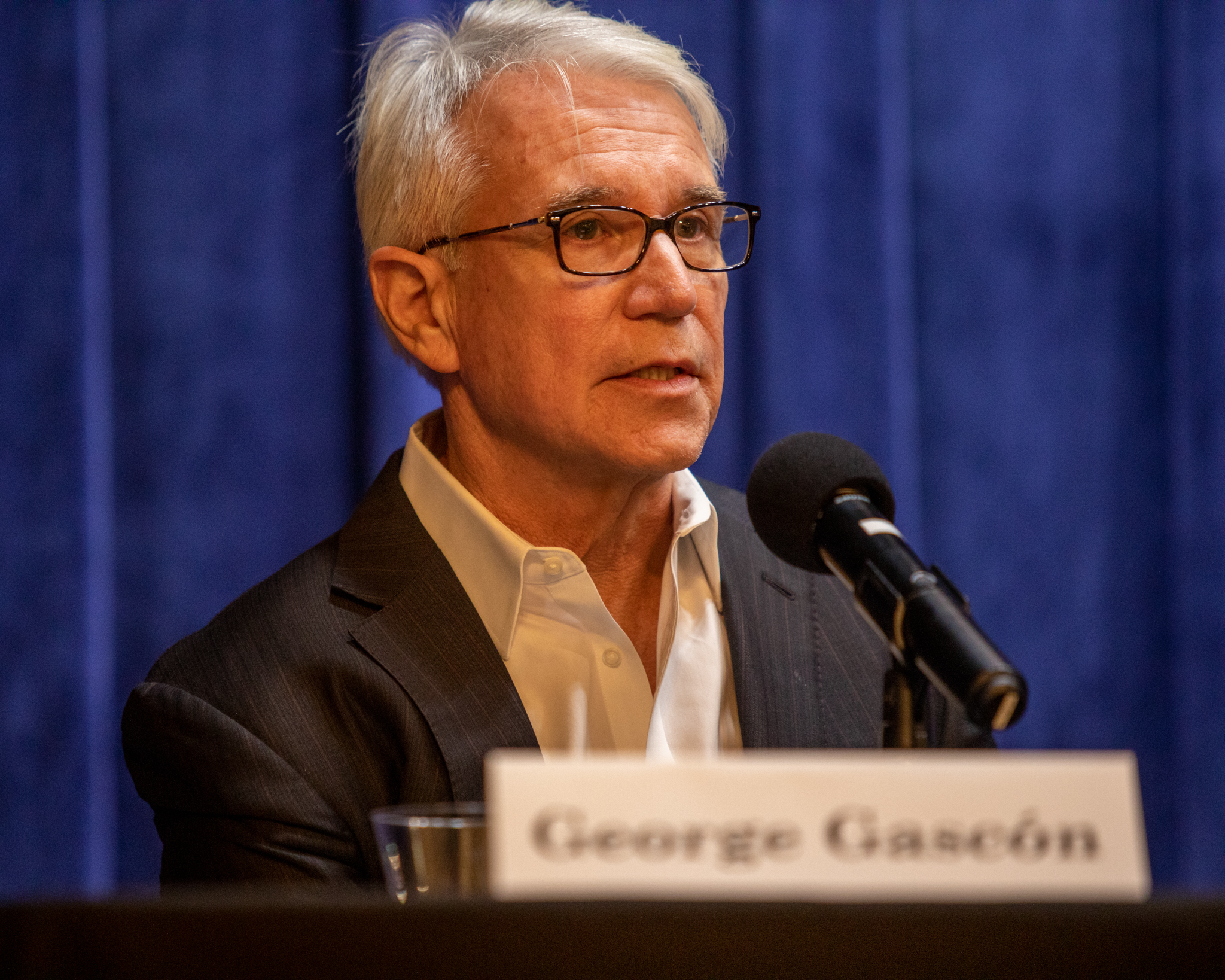

By David M. Greenwald
In a move that will add more fuel to the fire, Judge James Chalfant granted a preliminary injunction enjoining DA George Gascón from using his discretion in dismissing sentencing enhancements.
Upon assuming office, Gascón issued a series of special directives that, as Judge Chalfant put it, “all but repealed California’s sentencing enhancement laws and commanded his employees—Los Angeles County prosecutors sworn to uphold and enforce the law—to violate numerous statutory mandates and refrain from performing their duties under the law.”
The judge writes: “The Special Directives require prosecutors to violate California law, their oaths of office, and their ethical and professional obligations.”
He continues, “The Special Directives violate Respondents’ duty to prosecute violations of general laws under Government (‘Govt.’) Code section 26500, which is mandatory, not discretionary. Although a district attorney has discretion to determine what charges to file (if any) in a particular case, the district attorney cannot wholly decline to exercise that discretion by indiscriminately prohibiting the prosecution of all violations of certain offenses.”
The Special Directives further, the judge writes, “seek to circumvent the court’s role by requiring County prosecutors to file an amended charging document abandoning the allegations in the event the motion to strike is denied.”
Chalfant rules, “This tactic runs afoul of Penal Code section 1386, which provides that once a prosecution has been initiated, neither the Attorney General nor the district attorney can discontinue or abandon a prosecution for a public offense without permission of the court. Respondents have a ministerial duty to proceed with prosecution once it has been initiated unless the court permits it to be dismissed. Respondents have failed to perform this duty.”
The ruling would enjoin the DA from compelling deputy DAs to comply with his special directive, which right now would prohibit them from pleading and proving prior strikes, require them to move to dismiss any strike enhancements, and require them to make a post-conviction motion to dismiss any special circumstance allegations, among other things.
According to the judge, Michele Hannisee, the head of the ADDA (Association of Deputy District Attorneys), argued that “the District Attorney’s Special Directives prohibit deputy district attorneys from complying with their ministerial prosecutorial duties in violation of the law, their oaths of office, and their ethical responsibilities as officers of the court.”
Writes the judge, “No permissible justification exists for the unlawful directives. It is no answer for the District Attorney to claim publicly that ‘[p]rosecutors are sworn to follow the directives of the elected D.A.’” He adds, “Deputy district attorneys, like all county prosecutors within the state, swear an oath only to defend and uphold the Constitution, not the district attorney.”
Gascón, on the other hand, contended that he has implemented the Special Directives as the duly elected District Attorney “in the wake of significant research showing excessive sentencing practices yield no public safety benefit and do not promote the interests of justice.”
He argued that he had “no ministerial duty to plead the relevant sentencing enhancements under the Three Strikes law.”
He cited a California Supreme Court ruling: “Under California’s Three Strikes law, the sentence that is actually imposed upon a defendant in a particular case is dependent [in part]… upon the prosecutor’s exercise of prosecutorial discretion in determining how many prior convictions to charge in the case.”
The DA added, “There is nothing wrong with the elected district attorney—as opposed to line prosecutors—setting policies predicated on how that district attorney believes his office’s prosecutorial discretion should be exercised in seeking the dismissal of sentencing enhancements. There further is no ethical issue for the County’s deputy district attorneys in following these directives.”
Judge Chalfant notes that prosecutors “in every jurisdiction of the United State have considerable discretion.”
However, he argues, “A district attorney’s discretion is not unlimited. He or she must work within the framework of the criminal system. The legislature also is entitled to enact laws intruding on the executive or judicial branches of government so long as they do not defeat or materially impair that branch’s core function.”
He writes, “In exercising prosecutorial discretion, a district attorney’s core function is to ensure that the guilty are prosecuted.”
The judge acknowledges, “Gascón’s Special Directives cannot come as a surprise. He was elected with more than 1.6 million votes on a platform of reform-minded and less punitive approaches to a variety of conduct, including serious offenses previously punished with extreme prison terms.”
The ACLU filed an amicus in this case contending that “Romero is instructive” as it allows the trial court to strike prior strikes without the prosecutor’s involvement.
“Amicus ACLU argues that Romero’s reasoning applies to the present case. Just as the judicial power to dismiss an action includes the lesser power to strike sentencing allegations, prosecutorial discretion to decline to bring a criminal charge necessarily includes the lesser power to decline to plead sentencing enhancements connected to a criminal charge,” the judge writes, and the ACLU believes that ADDA’s interpretation of the “law takes away this prosecutorial discretion in a manner that raises serious constitutional questions.”
Writes Chalfant, “The court concludes that there is ambiguity in the language of the Three Strikes law that the district attorney must ‘plead and prove’ strike priors.”
The court thus concludes: “The District Attorney has abandoned the Three Strikes law through the Special Directives that prevent deputy district attorneys from pleading and proving strike priors as required by section 667(f)(1). As demonstrated by the plain language of the Three Strikes law and case law, this direction is unlawful.”
Judge Chalfant believes that the ADDA “has shown a probability of success on its claims that the Special Directives unlawfully compel deputy district attorneys to (a) not plead strike priors in violation of the Three Strikes law, (b) dismiss or withdraw strike priors in violation of the Three Strikes law, section 1385, and section 1386, and (c) read an inaccurate, incomplete, and inconsistent statement to the trial court.”
The judge concludes as well that the ADDA has “shown a probability of success on other sentencing enhancements” but has “not shown that the District Attorney’s blanket policy against prior enhancements is a failure to exercise discretion.”
Responding to the ruling, the LA County Public Defender’s union tweeted, “Today’s ruling will not deter us or our community partners from working toward a more equitable and data-informed legal system. Three Strikes are embedded with racism and do not make our communities safer.”
They added, “We stand with the elected DA of LA County’s commitment to confront and dismantle the persistent systemic racism in our legal system.”
—David M. Greenwald reporting
To sign up for our new newsletter – Everyday Injustice – https://tinyurl.com/yyultcf9
Support our work – to become a sustaining at $5 – $10- $25 per month hit the link:

What fire? :)
I suspect that this fire of which you speak is both “contained” and “diminishing” (outside of certain circles).
Really? Have you not been paying attention to LA? This is like Dred Scott of 2021.
I hate to tell you, but I’d also have to look up “Dred Scott”. Rest assured, I’m sure that it’s something I should either be appalled about, or celebrated. (Not sure which.)
Either way, I’d suggest that you take me to task for not knowing. :)
If it’s any consolation, the name sounds familiar. I’m going to guess that I should be appalled.
Well – I started looking it up (as I typed this), and already don’t see the comparison.
So to answer your question, I guess not. (Other than the mass migration out of Los Angeles and corresponding rent drop – an entirely different issue.) Oh, and homelessness, there.
OMG. You didn’t know what Dred Scott was?
:)
Like I said, the name is familiar, but didn’t recall until I started looking him up. Still don’t know the details, but it’s irrelevant unless you establish some connection to this article.
I don’t know if DG is playing along with the joke, or is missing the irony :-|
The decision should leave you with a sense of dread.
Though some claim that the lawlessness in California (and homelessness) are contributing to that phenomenon.
So, perhaps the former might have a relationship to Gascon (and those like him).
And perhaps the latter, as well (got cut-off).
Nowhere close… hyperbole on super-steroids on your part…
Not sure who is more ignorant… you or Ron O… OMG!
Way past the line to equate this decision to Dred Scott… you should be ashamed to make that parallel…
And I didn’t have to look the Dred Scott decision up… facts and implications, far, far different!
You’re the only one allowed to be flippant Bill? I didn’t know Ron wasn’t going to know what Dred was.
It was a flippant analogy Bill – but my point was simple, the Dred Scott decision basically forced the Civil War eventually. This decision if it stands (and it probably won’t) would completely nullify the DA reform movement. (Of course this was a district level court and Dred was the Supreme Court – but as I said, a flippant analogy).
I see the DA reform movement as being doomed to failure, right from the start. We’re already seeing negative reactions to it.
As a former commenter once noted, it’s already “too late” when someone comes to the attention of the criminal justice system.
The “fire” to change it (at that point) only exists within limited circles. There is no “civil war” – it will simply dimish.
Maybe you’ll need to make friends with Reisig, after all. :)
There does seem to be, however, attorneys who essentially make (or enhance) their living from pushing that agenda. So, maybe it won’t totally die, as long as they have a receptive audience.
Perhaps the Vanguard functions as a training ground to some degree, for those type of future attorneys? (Including associated networks of those who have similar interests?)
Well, why not – I guess. But the “fire” may not exist beyond that limited circle.
Most people are more concerned about being a potential victim of crime, vs. concerns for those perpetrating them. And it will always (ultimately) be that way.
Oh – and rest assured that this circle knows (by heart) the details of the Drew Scott case. :)
Living and breathing it since high school, no doubt.
I did hear that George Washington chopped down a cherry tree (for the purpose of proving that he was subsequently honest about it?) :)
Something about wooden teeth, as well.
Words matter.
My analogy wasless to the details and more to the potential impact of the ruling if it means that DA’s don’t have the discretion on three strikes for example, that probably substantially changes the focus of reform in California
Sounds like the DA over-reached and tried to implement reforms that need to actually be implemented by the legislature.
The judge here in my opinion is wrong (or at least overreached finding that plead and prove is mandatory) – the DA always has the discretion as to whether or not to charge enhancements.
They have that discretion, I guess, on a case by case basis. It seems that what the judge is saying is that the DA has issued a directive that blatantly and directly violates a voter-approved state law. Hence the overreach. This may blow back really badly against Gascon.
He ran on doing this. He did nothing that Boudin hadn’t implanted up in SF. It is a way overreach to argue that the DA is required to plead and prove strikes. This is the same judge btw, who ruled that the outdoor COVID eating ban was unconstitutional.
Just a “deep state” disinformation item…
The wooden dentures, not so much.
Oh, and I learned about Dred Scott in JHS… have not “breathed it”, but remember it.
It’s even worse than that – it left me with a sense of “Drew”
Misspelled the name, earlier. :)
Hopefully, I didn’t also misspell “misspell”.